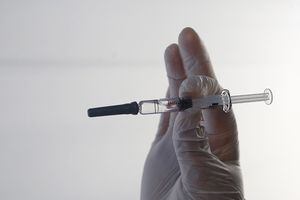In April, the Institute of Public Health announced that a total of 4,131 cases respiratory virus,this means 37.3% increase relative to the previous year.
Faced with this situation, explains Marcela Quintas, a pediatrician at the Pediatric Emergency Services Center at the Bupa Reñaca Clinic, “We see significantly increased Pediatric consultation, especially for viral infectious diseases Severity is higher in children under 4 years of age, Especially at under 1 year old“.
To this end, professionals say it is important for people to understand When should a minor be taken to the emergency room? and when not relevant.
If a child, regardless of age, begins to have Difficulty breathingthat is, it renders “Difficulty breathing, sinking between or below the ribsit is necessary to go to the emergency services immediately, because the minor may be seriously ill and eventually, need oxygen support“.
The doctor also commented that if the child develops “uncontrollable fever“, if the usual measures are not relieved, they should be sent to the emergency room.
According to professionals, if A child younger than two months begins to have a severe coughwhich stop eating Correct, they must “go to emergency services with or without fever or difficulty breathing.”
Quintas said the following signs should be looked out for, as minors should go to the emergency room if they show any:
- The newborn has a fever or hypothermia.
- Children younger than 3 months with fever, cough, diarrhea, or vomiting.
- Children who refuse oral hydration.
- Urine is thin or foul-smelling.
- Fever is uncontrollable or lasts longer than three days.
- Children under three months with fever should leave immediately.
- Difficulty breathing, such as rapid breathing, flapping of the nose, wheezing, blue lips, and trouble speaking.
- Seizure of any kind.
- Very sleepy or disoriented children.
- Frequent vomiting prevents oral rehydration.
- Diarrhea with blood streaks.
If the child does not have the above symptoms, it may be home treatment For these cases, according to Zepeda, the measures are prevent secretions from accumulating in the nose minors, such as stay hydrated and “give some Antipyretic If the patient has a fever or pain”.
Furthermore, he also stated that Flu vaccine and coronavirus “They’re still very effective at avoiding serious illness.” Additionally, it suggests Avoid Pollution in the Homespecifically, Cigarette smoke.
This is because children are more vulnerable in this situation, as the bronchopulmonary pediatrician commented, with cigarette smoke“have Increased risk of otitis media, bronchitis, or pneumonia.
In this regard, pediatricians also said that reasonable management should be carried out before treatment. fever, because it works like ” Defense Mechanisms Against Microorganisms” and “In addition activate the immune systemso its management must be judicious, preferably 38° or 38.5°to let the immune system do its job unless there is a history of febrile seizures.

According to professionals from the University of Chile Clinical Hospital, adults can take the following measures prevent children from getting infected:
- Avoid contact with people who are sick.
- The right to participate in activities in the open space.
- handwashing.
- Blow your nose with a disposable tissue.
- When sneezing or coughing, hold the crease of your elbow close to your mouth and nose.
- Face coverings are still useful if you’re going to be in an enclosed space.
